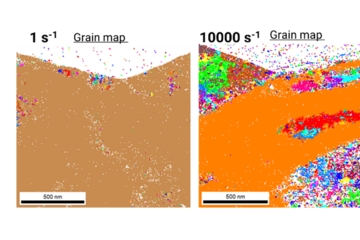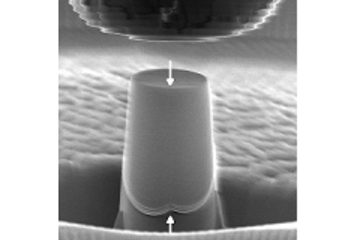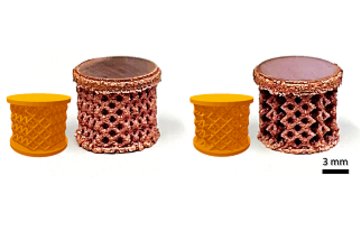All genres
81.
Journal Article
Ordering of primary carbonitrides in an austenitic steel revealed by transmission electron microscopy and atom probe tomography. Materials 11 (11), 2321 (2018)
82.
Journal Article
Bidirectional Transformation Enables Hierarchical Nanolaminate Dual‐Phase High‐Entropy Alloys. Advanced Materials 30 (44), 1804727 (2018)
83.
Journal Article
Combinatorial metallurgical synthesis and processing of high-entropy alloys. Journal of Materials Research 33 (19), pp. 3156 - 3169 (2018)
84.
Journal Article
Boron doped ultrastrong and ductile high-entropy alloys. Acta Materialia 151, pp. 366 - 376 (2018)
85.
Journal Article
Strain Rate Sensitivity of a TRIP-Assisted Dual-Phase High-Entropy Alloy. Frontiers in Materials Structural Materials 5 (30), pp. 1 - 10 (2018)
86.
Journal Article
Hydrogen embrittlement of an interstitial equimolar high-entropy alloy. Corrosion Science 136, pp. 403 - 408 (2018)
87.
Journal Article
Influence of compositional inhomogeneity on mechanical behavior of an interstitial dual-phase high-entropy alloy. Materials Chemistry and Physics 210, pp. 29 - 36 (2018)
88.
Journal Article
Corrosion behavior of an equiatomic CoCrFeMnNi high-entropy alloy compared with 304 stainless steel in sulfuric acid solution. Corrosion Science 134, pp. 131 - 139 (2018)
89.
Journal Article
In-situ SEM observation of phase transformation and twinning mechanisms in an interstitial high-entropy alloy. Acta Materialia 147, pp. 236 - 246 (2018)
90.
Journal Article
Unexpected cyclic stress-strain response of dual-phase high-entropy alloys induced by partial reversibility of deformation. Scripta Materialia 143, pp. 63 - 67 (2018)
91.
Journal Article
Engineering heterostructured grains to enhance strength in a single-phase high-entropy alloy with maintained ductility. Materials Research Letters 6 (11), pp. 634 - 640 (2018)
92.
Journal Article
Enhanced strength and ductility in a friction stir processing engineered dual phase high entropy alloy. Scientific Reports 7 (1), 16167 (2017)
93.
Journal Article
Ab initio assisted design of quinary dual-phase high-entropy alloys with transformation-induced plasticity. Acta Materialia 136, pp. 262 - 270 (2017)
94.
Journal Article
Hydrogen enhances strength and ductility of an equiatomic high-entropy alloy. Scientific Reports 7 (1), 9892 (2017)
95.
Journal Article
A TRIP-assisted dual-phase high-entropy alloy: Grain size and phase fraction effects on deformation behavior. Acta Materialia 131, pp. 323 - 335 (2017)
96.
Journal Article
Hydrogen effects on microstructural evolution and passive film characteristics of a duplex stainless steel. Electrochemistry Communucations 79, pp. 28 - 32 (2017)
97.
Journal Article
Strong and Ductile Non-equiatomic High-Entropy Alloys: Design, Processing, Microstructure, and Mechanical Properties. JOM-Journal of the Minerals Metals & Materials Society 69 (11), pp. 2099 - 2106 (2017)
98.
Journal Article
Interstitial atoms enable joint twinning and transformation induced plasticity in strong and ductile high-entropy alloys. Scientific Reports 7, 40704 (2017)
99.
Journal Article
Interfacial Mechanical Behavior and Electrochemical Corrosion Characteristics of Cold-Sprayed and Hot-Rolled Titanium/Stainless-Steel Couples. Advanced Engineering Materials 18 (7), pp. 1240 - 1249 (2016)
100.
Journal Article
Metastable high-entropy dual-phase alloys overcome the strength–ductility trade-off. Nature 534, pp. 227 - 230 (2016)











